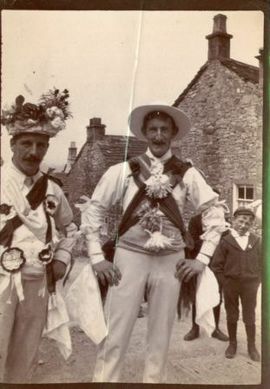Annotation:Blue Eyed Stranger (3) (The): Difference between revisions
No edit summary |
No edit summary |
||
| Line 3: | Line 3: | ||
{{TuneAnnotation | {{TuneAnnotation | ||
|f_tune_annotation_title= https://tunearch.org/wiki/Annotation:Blue_Eyed_Stranger_(3)_(The) > | |f_tune_annotation_title= https://tunearch.org/wiki/Annotation:Blue_Eyed_Stranger_(3)_(The) > | ||
|f_annotation='''BLUE-EYED STRANGER [3], THE'''. England, Morris Dance Tune (4/4 time). G Major. Standard tuning (fiddle). AB. This version of "Blue-Eyed Stranger" was collected by folklorist [[wikipedia:Cecil_Sharp]] when he visited the Derbyshire village of Winster in 1908 (see also "[[Winster Gallop]]," "[[Winster Morris Dance]]," "[[Morris (The)]]," and "[[Reel (2) (The)]]"). The first mention of the morris at Winster is in 1863, however, it was considered to have been well-established at the time. Morris dance teams have continued to perform at Winster to the present day, with hiatuses during the World Wars. | |f_annotation=[[File:Winstermorris.jpg|right|270px|thumb|Winster morris dancers at the time of Sharp's visit in 1908. Sharp's photographs were taken by T. Lennox Gilmour, leader writer and photographer on the Morning Post]]'''BLUE-EYED STRANGER [3], THE'''. England, Morris Dance Tune (4/4 time). G Major. Standard tuning (fiddle). AB. This version of "Blue-Eyed Stranger" was collected by folklorist [[wikipedia:Cecil_Sharp]] when he visited the Derbyshire village of Winster in 1908 (see also "[[Winster Gallop]]," "[[Winster Morris Dance]]," "[[Morris (The)]]," and "[[Reel (2) (The)]]"). The first mention of the morris at Winster is in 1863, however, it was considered to have been well-established at the time. Morris dance teams have continued to perform at Winster to the present day, with hiatuses during the World Wars. | ||
|f_source_for_notated_version= | |f_source_for_notated_version= | ||
|f_printed_sources=Bacon ('''The Morris Ring'''), 1974; p. 319. | |f_printed_sources=Bacon ('''The Morris Ring'''), 1974; p. 319. | ||
Revision as of 01:17, 19 September 2021
X:1 T:Blue-Eyed Stranger [3] M:4/4 L:1/8 N:Winster version K:G G2BF|G2D4 D2|E3F G2BA|G2D2D2D2|E3F G2 BF|G2D4D2| EDEF G2A2|B2d2 cBAF|E3F G4||G2BF|GABc d2d2| B2c2d4|GABc d2d2|B2c2d4|GABc d2d2|edcB A2 GA|B2d2 cBAF|E3F G4||


